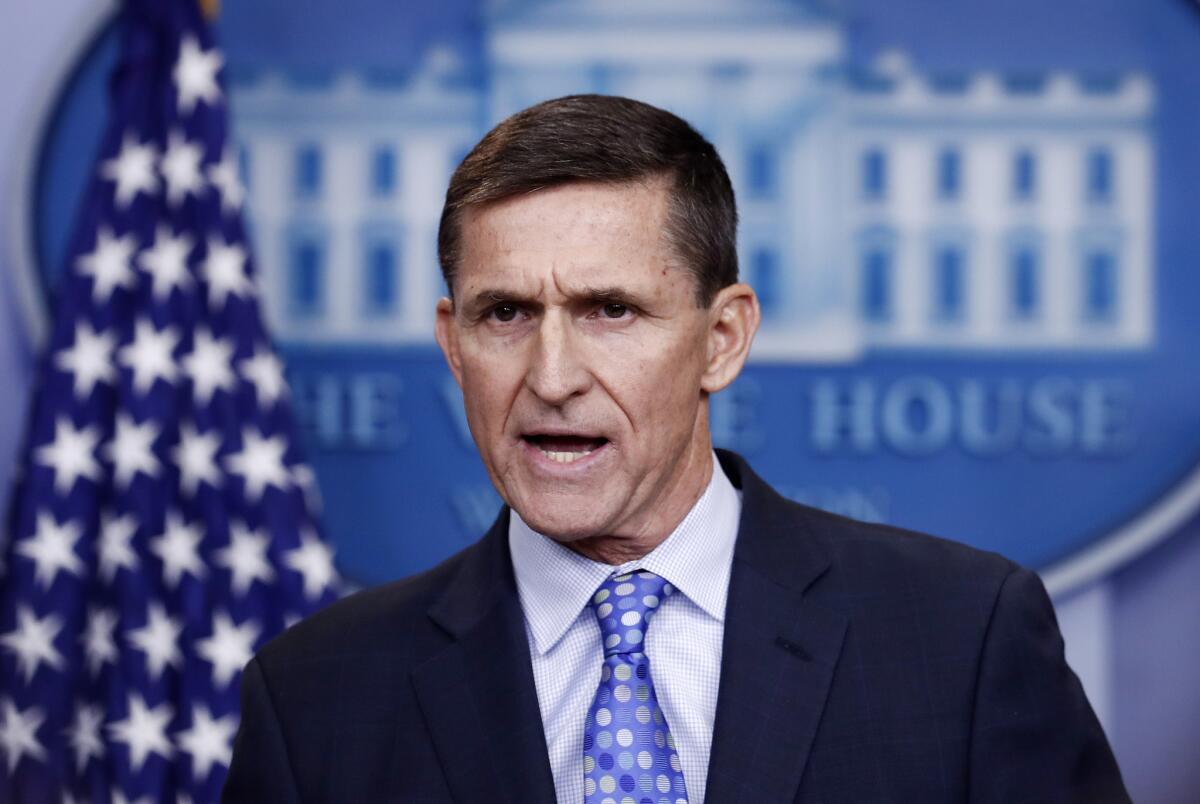Lawmakers say Flynn did not disclose lobbying and payments from Turkey and Russia

Reporting from Washington — President Trump’s former national security advisor, Michael Flynn, may have violated the law when he failed to disclose large fees from business dealings in Russia and Turkey shortly before he joined the White House, the leaders of the House Oversight Committee said Tuesday.
The disclosure by Reps. Jason Chaffetz (R-Utah) and Elijah E. Cummings (D-Md.) marks the first potential legal fallout from the swirl of investigations by congressional committees and the FBI into whether any of Trump’s current or former aides coordinated with Russian authorities before or after November’s election.
There is no indication that Flynn, a retired Army three-star general who once headed the Defense Intelligence Agency under President Obama, is a target in the FBI counter-intelligence inquiry, which began last summer.
But his apparent failure to obtain Pentagon permission to receive foreign payments, or to disclose them on required vetting forms, could violate several statutes, including a constitutional ban on foreign payments to retired military officers, known as the emoluments clause, according to Chaffetz and Cummings.
The two lawmakers said that Flynn did not seek permission from the Pentagon, as is required, to accept a $33,750 fee to attend a December 2015 gala in Moscow sponsored by RT, a state-run TV network, and to attend a lunch where Flynn sat beside Russian President Vladimir Putin.
In all, Cummings said, Flynn was paid more than $67,000 by Russian companies before the November election.
Flynn’s company, Flynn Intel Group, also received $530,000 for work it did last fall — at the height of the campaign — that benefited the government in Turkey, the committee has found. He retroactively disclosed that work last month on a federal disclosure form.
Omitting information from a federal disclosure form required for a security clearance can result in criminal penalties for false statements of up to five years in prison and a $10,000 fine.
“As a former military officer, you simply cannot take money from Russia, Turkey or anybody else,” Chaffetz, the committee chairman, said Tuesday after receiving a Pentagon briefing about what Flynn had disclosed about his Moscow trip. “And it appears as if he did take that money. It was inappropriate, and there are repercussions for a violation of law.”
The lawmakers’ comments raised the possibility that Flynn could face prosecution — at a minimum for failure to disclose the payments — and added to the mounting questions about whether he and several other Trump associates may have violated the law in their dealings with Russia.
When Flynn filed a form to renew his security clearance in early 2016, shortly after he had returned from Moscow, he did not disclose the money he had been paid, according to Cummings. He said the panel had obtained Flynn’s SF 86, the disclosure form required for a security clearance.
“There is no evidence anywhere in these documents that he reported the funds he received for his trip. There is also no evidence that he sought permission to obtain these funds from a foreign source,” Cummings said.
Flynn was a close confidant of Trump during the campaign and famously led the Republican National Convention crowd last summer in chants of “Lock her up!” referring to Democratic nominee Hillary Clinton.
It was the latest blow for Flynn, who was forced to resign in February after less than a month as Trump’s top national security aide after news reports revealed he had misled Vice President Mike Pence and other White House officials about his conversations in December with Russia’s ambassador about easing U.S. sanctions on Russia.
The revelation by the House Oversight Committee, which has jurisdiction over financial disclosure issues, also deepened the troubles the White House faces on Capitol Hill, where the GOP-led House and Senate intelligence committees are conducting separate, broader investigations into Russia’s interference in last year’s election.
The Senate Judiciary Committee joined the fray on Tuesday. Sen. Lindsey Graham (R-S.C.) announced that the subcommittee he leads on crime and terrorism would hold a hearing on May 8 to “investigate Russia’s interference” in the election, at which it would hear from James R. Clapper, the former director of national intelligence, and Sally Yates, former acting attorney general.
White House Press Secretary Sean Spicer sought to distance the administration from Flynn’s difficulties Tuesday, telling reporters that whether Trump’s former national security advisor broke the law was “a question for him and a law enforcement agency.”
“I don’t know what he filled out and what he did or didn’t do,” Spicer said. “He filled that form out prior to coming here, so it would be up to the committee and other authorities to look at that.”
The White House recently turned down the House Oversight Committee’s request for any documents mentioning Flynn’s foreign contacts or payments before or while he was national security advisor.
In an April 19 letter released by the committee, Marc T. Short, the White House director of legislative affairs, said the White House did not have documents concerning Flynn’s foreign contacts before he joined the administration, and would not provide any papers on his contacts during his brief White House tenure.
That response irked Cummings, the ranking Democrat on the committee.
“We have received no internal documents relating to what Gen. Flynn reported to the White House when they vetted him to become national security advisor,” he said.
Flynn’s attorney, Robert Kelner, said in a statement that his client told the Defense Intelligence Agency about his 2015 trip to Moscow. Kelner’s statement did not address whether Flynn disclosed the fee he was offered by the Russian government TV network.
As the former director of the Pentagon’s spying arm, Flynn was covered by Defense Department regulations requiring him to inform the agency prior to traveling overseas and about any contacts with officials from governments that are U.S. adversaries, officials said.
“As has previously been reported, Gen. Flynn briefed the Defense Intelligence Agency … extensively regarding the RT speaking event trip both before and after the trip, and he answered any questions that were posed by DIA concerning the trip during those briefings,” Kelner said.
The lobbying disclosure form that Flynn filled retroactively last month revealed that his company worked for Inovo, a firm with connections to Turkish President Recep Tayyip Erdogan’s government.
In an accompanying letter, Flynn’s lawyer acknowledged that the arrangement “could be construed to have principally benefited the republic of Turkey.”
The business arrangement began in September — during the presidential campaign — and was terminated after the election in November.
Flynn’s attorney said his work focused on Fethullah Gulen, an Islamic cleric who was given political asylum in the United States and lives in a rural compound in Pennsylvania. Erdogan’s government considers Gulen a terrorist and has long sought his extradition.
“From Turkey’s point of view, Washington is harboring Turkey’s Osama bin Laden,” Flynn wrote in an op-ed that appeared in the Hill newspaper on Nov. 8. It referred to Gulen as a “shady Islamic mullah” and “radical Islamist,” charges that the cleric has denied.
Kelner last month sought immunity from prosecution for Flynn in return for his testimony to the House and Senate intelligence committees, but the committees turned him down.
Times staff writer Noah Bierman contributed to this report.
ALSO
A veteran prosecutor takes over No. 2 job at Justice Department — and the Russia investigation
Trump White House touts achievements but downplays 100-day expectations
Trump backs off border wall fight for now, easing government shutdown threat
More to Read
Sign up for Essential California
The most important California stories and recommendations in your inbox every morning.
You may occasionally receive promotional content from the Los Angeles Times.











